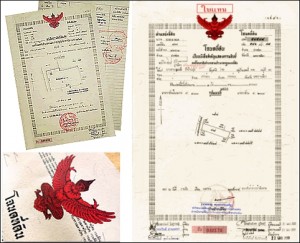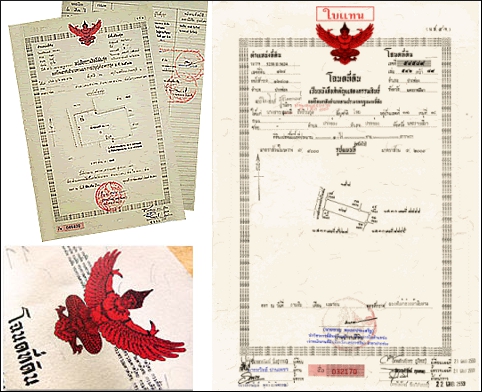
Anywhere across the globe, the land title deed is a document that holds utmost importance. A land title deed shows not only a person’s rights to a piece of land, but also reveals other registered encumbrances such as mortgages, leases, etc. on that particular land or property.
In Thailand like in other nations, there are several types of land title certificates; however, the Chanote and Nor Sor 3 Kor are mostly recognized by both the buyer and seller or lessees and landlords. These two title certificates equate to freehold ownership where boundary and size is confirmed by the government. Chanote and Nor Sor 3 Kor can be developed and can be used by Thai entities for loan collateral. Leases can also be registered on these two types of title.
Chanote can act as evidence of ownership, and can be used to engage in legal acts upon that land, while Nor Sor 3 Kor has less specific land demarcations than the Chanote.
A third type of title is the Nor Sor 3. This title is weak in terms of boundaries and land area. Measurements undertaken by the Land Department are required in order to indicate the exact boundary and definite land area of each title before the transaction is made. In general, and if possible, a willing buyer will ask the seller to upgrade a Nor Sor 3 to a Chanote deed before they make the transaction. The boundary and land area after the upgrade will then be used as the basis for the transaction value of that specific site.
The lower grades of land title certificate include the Sor Kor 1, Por Bor Tor 5, Sor Por Kor 401, etc. These are poor quality land titles and holders of this type of title must be aware that their rights may not be legally enforceable.
FOR FOREIGNERS WHO WANT TO BUY PROPERTY IN THAILAND:
Owing to its huge potential and being one of the most secure nations in Asia, foreign investors are targeting Thailand for long-term investment in the real estate sector.
Sometimes the legal situation for property ownership in Thailand can look a bit confusing for foreigners, but actually there is a very clear system behind it. Based on the quality of a land title, the rights and security for the property owner can be very different.
Thai law doesn’t give a foreigner to own land in her/ his name in the country. She/ he has been given the right of ownership of buildings only. If a foreigner wishes to purchase land to build a property in Thailand, she/ he has the option to purchase the land on a 30-year leasehold, with an option to extend the lease for further 30 year periods.
Possession of the land is assured by virtue of the fact that the property occupies the land. The lessor cannot seize the property upon expiration of the lease, as the property is separate from the land.
DIFFERENT TYPES OF LAND TITLE DEEDS IN THAILAND:
There are many different types of land titles in Thailand, the majority of which do not allow for the legal right to build on that land. Real estate experts recommend only 3 land titles: Nor Sor 3, Nor Sor 3 Gor, and Chanote.
Here are the different types of land title deeds in Thailand:
Chanot (Nor Sor 4): This type of title deed, registered at the Land Department in the province in which the land is located, grants the holder of the documents full rights over the land. It is therefore the strongest type of title deed. The title deed contains a legal description of the land boundary markers that are carefully ascertained and referenced by satellite images.
Nor Sor 3 Gor: This land title designates ownership of land with fairly certain boundaries, however it is not yet a full land title (chanot). A final official measuring is required by the land department along with the placing of official markers. This type of land title may be sold, transferred, or mortgaged. If the owner of the land files a request with the Land Department, surveyors from the land department will measure the land, the title may be changed to Chanot.
Nor Sor 3: Although ownership of the land covered in this title is relatively ascertained, the Land Department has never measured or recognized the boundaries. Therefore boundary markers are normally placed by property owners rather than government authorities. Accordingly, the main risk is whether the boundaries and size of the land is accurate.
Possessory Right: This is normally an inherited land right proven by tax payments at the local administrative office. It is one of the weakest types of land rights.
Sor Por Kor 4-01: This is an agricultural title deed, usually found in rural areas. Government land is transferred for agricultural purposes to needy families. Residence is allowed on a portion of the land. It is difficult for a non-Thai to obtain an interest in this type of land deed.
LAND MORTGAGES IN THAILAND:
Land mortgages in Thailand must be made in writing and registered with the Land Department of Thailand. Mortgages do not include the buildings built on the land after the mortgage date unless they were agreed upon before the mortgage documents were signed.
Additionally, buildings and other immovable structures may be mortgaged separately and should be registered with the Land Department or local Amphur (province).
The fee for registering a mortgage is 1% of the amount declared in the mortgage agreement.
TAXES ON PURCHASE OF LAND OR PROPERTY IN THAILAND:
The transferring fee, withholding tax and the stamp duty or Specific Business Tax (SBT) must all be paid by either the buyer or seller when a property is purchased.
Although Sale and Purchase agreements differ, the buyer is typically responsible for the transfer fee, while the seller pays the stamp duty or specific business tax and the withholding tax.
Transferring Fee: 2% of the registered value of the property; paid at the Land Office on the day of transfer of ownership
Stamp duty: 0.5% of the appraised value of the property or the purchasing price, whichever is higher
Specific Business Tax (SBT): 3.3% of the appraised or actual price of the property, whichever is higher; Imposed only if the property is transferred less than five years after its purchase (If the SBT is levied, stamp duty will not have to be paid.)
DISCLAIMER: All details in the article are for reference only. Any agreement that you enter into, should be in consultation with a Solicitor or an Advocate. Holiday Home Times will not be responsible for any claim arising out of the use of any of the above mentioned information.To get more information & assistance, please submit the form below and our specialist will get in touch with you at the earliest.








